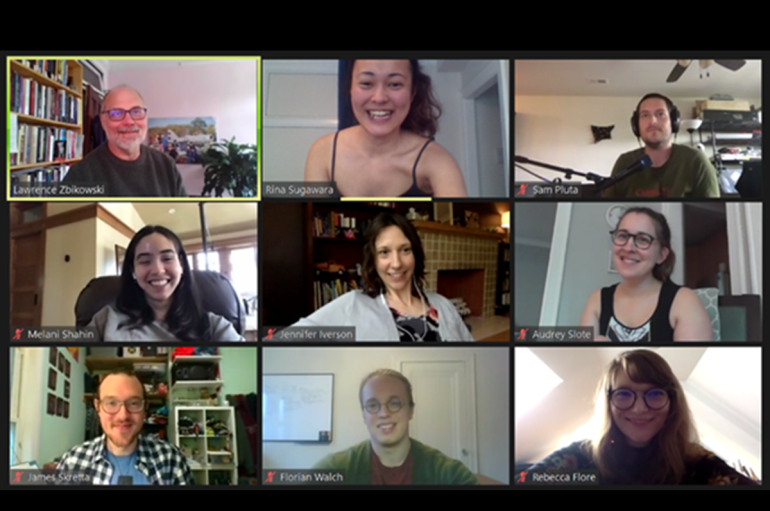
By Daniel Meyers
While the coronavirus and its impact on the way we live has fundamentally changed, and in some cases severely limited, the ways we engage with colleagues and socialize away from our work, it has also provided some unique and surprising opportunities. One such example is a new Music Theory Reading Group started this quarter by second year PhD student Rina Sugawara.
Sugawara’s idea wasn’t an entirely new one. Other graduate students in the Music Department had attempted launching similar groups in the past, but for various reasons, whether the burdens of the graduate student workload or the plethora of activities available – or most likely the combination of the two – the groups never seemed to stick. The remote Music Theory Reading Group that Sugawara has convened via Zoom, however, is about to round out a successful first quarter, and Sugawara expects it will continue in the future. It seems the unique conditions of a remote world provided a unique opportunity to begin something new.
The idea for this Music Theory Reading Group came about at the end of the 2020 Winter Quarter, right as everyone’s lives were about to be changed by the coronavirus. Sugawara was finishing her fifth quarter at the University, and in the midst of the intense level of coursework, she was feeling a bit detached from the music theory community at large.
“I voiced my concerns to Larry at the end of last quarter,” says Sugawara, referring to Professor Lawrence Zbikowski, a music theorist and the Department’s Director of Professional Development. “When this [the coronavirus pandemic and social distancing measures] all went down, he came to me and said, ‘I think this is a great time to bring a different kind of community together.’”
The Music Theory Reading Group really is a different kind of community. Meeting about once a week, the group includes students from all cohorts of the Department’s PhD program, including a few incoming students, as well as faculty. However, as Sugawara puts it, “there’s no ‘teaching’ happening.” At least not in the traditional sense. There is a lot of learning that goes on, though. “There is a really interesting collective forming that couldn’t have happened in a coursework kind of setting,” says Sugawara. “The unpretentious nature of this whole situation where we’re not required to be impressing the faculty, or having to speak in class at least once… It’s really an ideal way of being in academia.”
The group mixes music analysis with readings, selecting a different article or book chapter or an audio or video recording of a performance each week. The selections arise rather organically, with suggestions taken at the end of each meeting, and the somewhat casual process leads to a rather eclectic collection of material, most of it new to the whole group and not things that are a part of a typical curriculum. Examples of pieces the group has discussed so far include Mariusz Kozak's recent monograph Enacting Musical Time and Kate Soper’s “Unwritten Operas.”
The wide-ranging and varied nature of the reading group offers more than just the opportunity to learn from each other. It provides for a sort of free exploration that many PhD students might not encounter in their coursework, or that they might not be pushed to engage in in their research. When time is scarce and filled with classes to take and to teach, guest lectures to attend, concerts to go to, and often even a side-job, every moment available for research has to be judiciously allocated to where it’s likely to offer the most progress.
In the world of COVID, though, where we have nowhere to go but home, there’s a bit more bandwidth to spend reading a completely novel paper or exploring a performance entirely unrelated to one’s research. Suguwara expects that being exposed to new material, new ideas, and new music will impact the way she thinks about her own research into form and genre in the 20th century, and that impact is likely not limited to her.
While the impetus for the group and its initial success may be partially attributed to the unique circumstances of the global pandemic, Sugawara is hopeful the group will continue, even when the world returns to more of a semblance of ‘normal.’ “I was trying to imagine myself even a year from now when I’m no longer in coursework and how I would feel about this group,” she says. “I think I would really miss the community of being able to talk about random articles with people when I’m no longer in coursework and just working on my own dissertation work. So hopefully this is a space where both of that can happen – a gate way away from coursework, and also a return to kind of a coursework setting.”
Whether the group continues or not, its impacts will still be felt through the social connections that were built and sustained through social isolation, and hopefully in a feeling of ‘permission to be curious’ and a rekindled pursuit of novel ideas.
